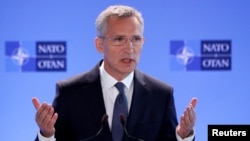NATO defense ministers rallied around their latest plans to contain Russia on Thursday, while keeping a lid on their frustrations over new steel tariffs that U.S. President Donald Trump has justified on national security grounds.
Briefly putting aside what NATO's chief said were "serious differences" within the alliance, defense ministers agreed a plan to protect the North Atlantic against increased Russian naval strength, move troops more quickly across Europe and have more combat-ready battalions, ships and planes.
"There are differences related to issues like trade, the Iran nuclear deal and climate change," NATO Secretary-General Jens Stoltenberg told reporters.
"We have disagreements between NATO allies but we stand together in NATO when it comes to the core task of NATO ... to protect each other."
German Defense Minister Ursula von der Leyen said there were "controversial issues" but that "the atmosphere and our cooperation here in the alliance are full of trust."
At the first meeting in NATO's new glass and steel headquarters, U.S. Defense Secretary Jim Mattis appeared relaxed and smiling in parts of the closed-door meetings broadcast to reporters but he did not speak publicly at NATO on Thursday.
Many ministers also avoided public comments.
One alliance diplomat told Reuters that in preparatory meetings, Trump's decision to target Europe on trade and Iran was absent from debates in an attempt to preserve unity, but that there were "elephants in the room."
Trump's "America first" rhetoric and inconsistent statements on NATO have morphed into policy that directly challenges European priorities, the diplomats said, citing new U.S. metal tariffs and Trump's withdrawal from the Paris climate change accord and the 2015 Iran nuclear accord.
A second NATO diplomat described the U.S. president as an unknown quantity with a lack of interest in the transatlantic ties that Europe and Canada cherish.
"U.S. Secretary of State Mike Pompeo came to NATO in April and made a very favorable impression, and everyone respects and admires Jim Mattis. But there's a fear and an uneasiness about what Trump will do next," the diplomat said.
DEFENSE SPENDING INCREASE
Trump is expected at a NATO summit in Brussels in July, a year since he first came to the alliance and publicly admonished allies for not spending enough on defense.
Stoltenberg unveiled higher expenditure estimates for NATO in 2018 to defence ministers. Spending by European governments, Turkey and Canada is expected to rise by 3.82 percent in 2018, which would be the fourth straight year of increases and would mean an $87.3 billion cumulative increase since 2015.
But Trump's envoy to the alliance, Kay Bailey Hutchison, warned before the meeting that the spending issue would remain a sore point for the president.
Following Russia's annexation of Crimea in 2014, NATO leaders committed to raise their defense spending towards 2 percent of economic output by 2024, but under current projections, only 15 of the 29 allies will meet that target.
"It will be an issue until we have that realized, it was a commitment made in Wales, to strive for that level," Hutchison said of the 2014 summit at which leaders made the pledge.
Mattis was in a delicate position in Brussels, trying to balance the need for a strong NATO, while backing Trump's decision to impose tariffs.
Trump infuriated European Union members, Canada and Mexico by imposing tariffs of 25 percent on steel and 10 percent on aluminium, which experts say could bleed into U.S. security relationships, even among America's closest allies.
"I think it's still premature to call it a trade war, because as it starts maturing, you know, there's only give and take on these things," Mattis told reporters en route to Brussels.
BRUSSELS —





